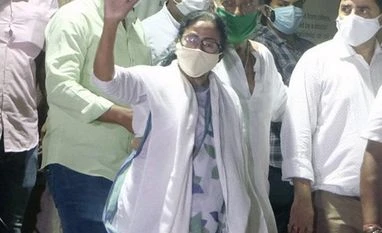A three-member TMC delegation was understood to have met the Chief Electoral Officer at the Election Commission office in Kolkata and sought a recount in Nandigram, even as Banerjee's protégé-turned-adversary Adhikari tweeted thanking the people of Nandigram for their "love, trust, blessings and support" and for choosing him as their representative. He even tweeted a result annexure showing a winning margin of 1,736 votes.
However, the vote count would have to be verified against voter-verified paper audit trail (VVPAT). If Banerjee loses Nandigram, she would have to get re-elected within six months.
In the high-stakes 294-seat state election, the Trinamool Congress registered its best performance ever, winning or leading in 216 seats and bagging a vote share of 48 per cent, as Bengal shrugged off allegations of “cut money” and corruption levelled by the Opposition against the incumbent.
“This is Bengal’s victory and victory of the people. They talked about a double-engine government, but I said we would score a double century. And you know what has happened,” Banerjee said.
However, Banerjee cautioned against victory celebrations in the wake of rising Covid-19 cases and said a victory rally at the Brigade Parade ground would happen only after the present coronavirus situation was in control.
Commenting on the mandate, Prime Minister Narendra Modi tweeted: “Congratulations to Mamata Didi for @AITCofficial’s win in West Bengal. The Centre will continue to extend all possible support to the West Bengal government to fulfil people’s aspirations and also to overcome the Covid-19 pandemic.”
He also tweeted: “I would like to thank my sisters and brothers of West Bengal who have blessed our party. From a negligible presence earlier, BJP’s presence has significantly increased. BJP will keep serving the people. I applaud each and every karyakarta for their spirited effort in the polls.”
The BJP has made huge gains from its performance in the 2016 Assembly election, but fell far short of its own projection of 200 seats, even as its central leadership – from Prime Minister Narendra Modi to Union Home Minister Amit Shah, central ministers and chief ministers from states ruled by the party, flew in and out for the election campaign.
The saffron party’s seat tally (victory and leads as of the time of publication) was at 73 and its vote share 38 per cent. That’s a huge jump from 2016, when it had got just three seats and a vote share of 10.16 per cent. In 2011, it had got a vote share of 4.14 per cent and failed to bag any seat.
The performance, however, had peaked in the Lok Sabha election of 2019 – when religion-based identity politics had taken the centre stage – and its vote share had surged to 40.64 per cent, with the seat tally at 18. The surge indicated that Bengal could be headed for “poriborton” (change).
Even though BJP has lost vote share since, the mandate has reconfirmed that the fight in Bengal is now completely bipolar – between the BJP and the Trinamool – as the Left Front-Congress-ISF alliance has fallen flat. The Congress has got a vote share of 3.01 per cent and the Communist Party of India (Marxist) 4.55 per cent, but neither has bagged any seat. The ISF is leading in one seat.
Political analysts pointed out that in Malda, Murshidabad and North Dinajpur, minority votes almost entirely shifted to the Trinamool Congress from the Congress.
“(In) the last three phases, the Trinamool Congress gained more than expected due to Covid mismanagement by the Centre. It seems there was a swing in favour of the TMC,” said an analyst.
About 114 seats went to vote in the last three phases across Malda, Murshidabad, Dinajpur, Kolkata (South & North), Bardhaman and Birbhum.
Except Adhikari, all of the Trinamool turncoats who had joined the BJP ahead of the elections lost. In Singur – the seat of land agitation in 2011 which had seen Banerjee’s rise to power – Trinamool candidate Becharam Manna won by a huge margin of 25,923 votes, defeating Rabindranath Bhattacharya, who had switched sides to the BJP before the election.
“This is like a reverse tsunami,” said a bureaucrat.
But an analyst pointed out that partially this was also a mandate for Mamata Banerjee’s welfare schemes.
A massive outreach programme, Duare Sarkar, was launched ahead of the election to deliver 12 welfare schemes, including Khadya Sathi (food security), Kanyashree (financial assistance to girls for pursuing higher education), Krishak Bondhu (for farmers and sharecroppers), and the star attraction Swasthya Sathi (the universal health scheme), at the doorstep. Basics like roads, drinking water and electricity in the last 10 years were also brought into focus.
Banerjee’s next task is cut out, too — managing the rising Covid cases in the state. She said she would lead a movement against the Centre for free vaccines.
To read the full story, Subscribe Now at just Rs 249 a month
Already a subscriber? Log in
Subscribe To BS Premium
₹249
Renews automatically
₹1699₹1999
Opt for auto renewal and save Rs. 300 Renews automatically
₹1999
What you get on BS Premium?
-
Unlock 30+ premium stories daily hand-picked by our editors, across devices on browser and app.
-
Pick your 5 favourite companies, get a daily email with all news updates on them.
Full access to our intuitive epaper - clip, save, share articles from any device; newspaper archives from 2006.
Preferential invites to Business Standard events.
Curated newsletters on markets, personal finance, policy & politics, start-ups, technology, and more.
Need More Information - write to us at assist@bsmail.in
)